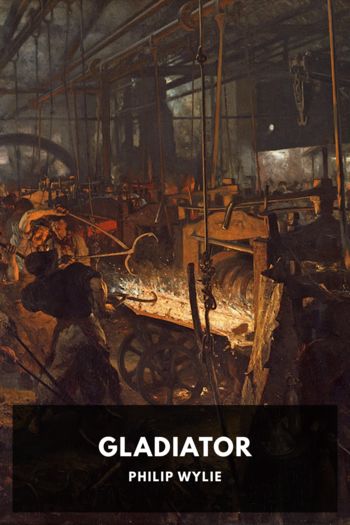Gladiator - Philip Wylie (readnow .TXT) 📗

- Author: Philip Wylie
Book online «Gladiator - Philip Wylie (readnow .TXT) 📗». Author Philip Wylie
He lit a fresh cigarette and planned what he would do. On the next night he would prepare himself very carefully. He would eat enormously, provide himself with food and water, rest as much as he could, and then start south and east in a plane. He would drive it far into Germany. When its petrol failed, he would crash it. Stepping from the ruins, he would hasten on in the darkness, on, on, like Pheidippides, till he reached the center of the enemy government. There, crashing through the petty human barriers, he would perform his last feat, strangling the Emperor, slaying the generals, pulling the buildings apart with his Samsonian arms, and disrupting the control of the war.
He had dreamed of such an enterprise even before he had enlisted. But he had known that he lacked sufficient stamina without a great internal cause, and no rage, no blood-madness, was great enough to drive him to that effort. With amazement he realized that a clenched determination depending on the brain rather than the emotions was a greater catalyst than any passion. He knew that he could do such a thing. In the warmth of that knowledge he completed his plan tranquilly and retired. For twelve hours, by order undisturbed, Hugo slept.
In the bright morning, he girded himself. He requisitioned the plane he needed through Major Ingalls. He explained that requirement by saying that he was going to bomb a battery of big guns. The plane offered was an old one. Hugo had seen enough of flying in his French service to understand its navigation. He ate the huge meal he had planned. And then, a cool and grim man, he made his way to the hangar. In fifteen minutes his last adventure would have commenced. But a dispatch rider, charging on to the field in a roaring motor cycle, announced the signing of the Armistice and the end of the war.
Hugo stood near his plane when he heard the news. Two men at his side began to cry, one repeating over and over: “And I’m still alive, so help me God. I wish I was dead, like Joey.” Hugo was rigid. His first gesture was to lift his clenched fist and search for an object to smash with it. The fist lingered in the air. His rage passed—rage that would have required a giant vent had it occurred two days sooner. He relaxed. His arm fell. He ruffled his black hair; his blacker eyes stared and then twinkled. His lips smiled for the first time in many months. His great shoulders sagged. “I should have guessed it,” he said to himself, and entered the rejoicing with a fervour that was unexpected.
XVIThere must be in heaven a certain god—a paunchy, cynical god whose task it is to arrange for each of the birthward-marching souls a set of circumstances so nicely adjusted to its character that the result of its life, in triumph or defeat, will be hinged on the finest of threads. So Hugo must have felt coming home from war. He had celebrated the Armistice hugely, not because it had spared his life—most of the pomp, parade, bawdiness, and glory had originated in such a deliverance—but because it had rescued him from the hot blast of destructiveness. An instantaneous realization of that prevented despair. He had failed in the hour of becoming death itself; such failure was fortunate because life to him, even at the end of the war, seemed more the effort of creation than the business of annihilation.
To know that had cost a struggle—a struggle that took place at the hangar as the dispatch-bearer rode up and that remained crucial only between the instant when he lifted his fist and when he lowered it. Brevity made it no less intense; a second of time had resolved his soul afresh, had redistilled it and recombined it.
Not long after that he started back to America. The mass of soldiers surrounding him were undergoing a transition that Hugo felt vividly. These men would wake up sweating at night and cry out until someone whispered roughly that there were no more submarines. A door would slam and one of them would begin to weep. There were whisperings and bickerings about life at home, about what each person, disintegrated again to individuality, would do and say and think. Little fears about lost jobs and lost girls cropped out, were thrust back, came finally to remain. And no one wanted life to be what it had been; no one considered that it could be the same.
Hugo wrote to his family that the war was ended, that he was well, that he expected to see them some time in the near future. The ship that carried him reached the end of the blue sea; he was disembarked and demobilized in New York. He realized even before he was accustomed to the novelty of civilian clothes that a familiar, friendly city had changed. The retrospective spell of the eighties and nineties had vanished. New York was brand-new, blatant, rushing, prosperous. The inheritance from Europe had been assimilated; a social reality, entirely foreign and American, had been wrought and New York was ready to spread it across the parent world. Those things were pressed quickly into Hugo’s mind by his hotel, the magazines, a chance novel of the precise date, the cinema,





Comments (0)